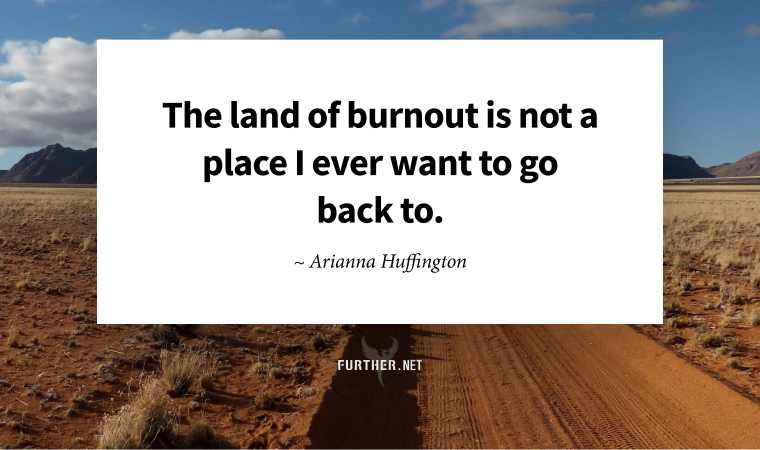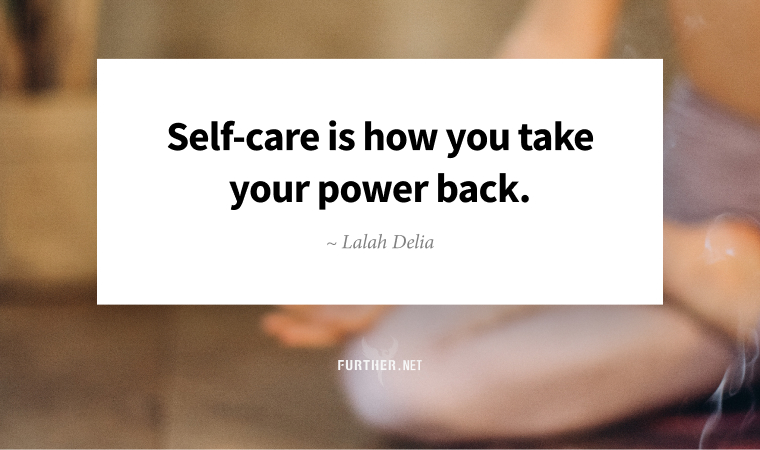
Join us in Well + Wealthy, the new Further community aimed at midlife reinvention through credible training, sustainable habits, and supportive accountability. Get the details here.
I recently hit the wall at work. By that I mean I burned out … almost to a crisp.
There were definite warning signs:
Dr. Jessi Gold, a psychiatrist at Washington University in St. Louis, knows she’s edging toward burnout when she wakes up, feels instantly angry at her email inbox and doesn’t want to get out of bed.
That was me a few weeks ago. And I had let it go on for a month before I did anything about it. Worse, I had known something was wrong for at least six months.
It’s not uncommon.
We tell ourselves it’s just a rough patch, and we’ll work harder to get through it. The second half of 2021 was challenging for me in various ways — a bold new direction for my business, the extension of the pandemic thanks to Delta and Omicron, and even my daughter moving out after graduation. And yet, I downplayed and rationalized the effect those challenges had on me.
I’m not alone in both being burned out and (eventually) doing something about it:
In a 2021 survey of 1,500 U.S. workers, more than half said they were feeling burned out as a result of their job demands, and a whopping 4.3 million Americans quit their jobs in December in what has come to be known as the “great resignation.”
Problem is, I work for myself … so apparently my boss is both a jerk and an idiot. Instead of listening to my body and understanding that I needed significant stress reduction, I kept adding more to my plate.
If that doesn’t make sense to you, well, it doesn’t make sense to me either. Figuring out the reasons why I did that to myself will require additional time and introspection. First and foremost, though, I had to do something about my situation before things got much more worse than they already were.
Of course, the key is to recognize the symptoms of burnout in your body early on and do something about it right away. Beyond doing yourself damage, you’re not doing anyone else any favors by soldiering on. As Trudi explores below in her piece about work wellness:
It’s not just okay to take care of yourself at work, it’s obligatory.
So, I’ve consolidated some of the things I was working on. And I’ve had to step aside from others. As I mentioned, the fact that it was so hard for me to make what now seem like obvious decisions to scale back will require additional soul searching.
My advice is simple … don’t let it happen to you. The first step is to understand the signs of burn out, and then fearlessly take care of yourself. After all, that’s your real job.
Your Body Knows You’re Burned Out
Keep going-
P.S. New to Further? Join us here.
Lean World Cuisine
Since the turn of the millennium, the percentage of people in the United States who are overweight or obese has risen consistently. So it stands to reason that we should look elsewhere for healthy eating options.
10 Healthy Eating Habits from Around the World
Think Sharp
Good news … your mental acuity is likely to remain just fine until about the age of 60, contrary to popular belief about middle age. And if you want to continue to remember the “good ol’ days” after 60, exercise at least three times a week.
Our Brains Stay Sharp Much Longer Than Thought
Retirement Regret
If you don’t have enough money to retire comfortably, that’s certainly going to result in regret. But so will retiring without a firm idea of what you want to do instead.
3 Signs You’ll Regret Early Retirement
The 7 Habits of Happy Older People
We’re not old yet, just like we’re not ready to retire. But to be happy when you’re older is similar to saving for retirement — you need to start investing in your future happiness now.
The Seven Habits That Lead to Happiness in Old Age
Work Wellness is the Secret to Your Success

By Trudi Roth
Thanks to the global pandemic shining a spotlight on how fed up we are with physical and psychological burnout in the workplace, it seems like things may finally be shifting towards a better life/work balance.
“Seems” is the operative word. Just because 38% of middle-aged people have joined in the “Great Resignation” and favor working from home doesn’t mean we have the real cure for what ails us. Research shows we’re putting in an average of 2.5 hours longer each day, plus extra time on weekends and holidays. I know I joke about what a relentless taskmaster my boss is, and I work for myself.
If we really want to drop the unhealthy work habits, then it’s time to start considering physical, mental, and emotional well-being all day long — not just when you’re “off-duty.” Time to put self-care on your workday to-do list.
Work Wellness
“Workplace wellness” has become a popular concept: even the CDC endorses programs for a healthier work environment. That’s not altruistic; it’s pragmatic. Stressed, overworked people are less productive and more likely to get sick, miss work, and eventually, quit.
Creating a healthier work environment wherever you conduct your business can’t just be lip service. Your job takes up about a third of your waking hours, so it takes a mindset shift to prioritize your well-being.
It’s not just okay to take care of yourself at work, it’s obligatory.
How’s that for a new kind of taskmaster? If you want to get better results at work, you need to get better at considering your well-being all day long.
Work at Self-Care
Self-care isn’t just a bubble bath, annual vacation, or occasional massage; it’s an intentional practice based on self-compassion and self-kindness focused on supporting better physical, emotional, and mental health.
So, what does this look like? Here are a few ways from each realm to help you get started.
Physical:
- Sit up straight (shoulders relaxed and back, spine aligned).
- Breathe deeply and consciously.
- Take a break to take a walk.
Emotional:
- Use music to elevate your mood. (Bonus: Ambient music and binaural beats can help improve your focus, productivity, and creativity. I recommend Brian Eno’s “Reflection.”)
- Take time to build friendly connections with colleagues and peers
- Celebrate milestones and wins of all sizes.
Mental:
- Set physical boundaries between work/home life — shut the door to your office and/or your computer.
- Learn something new: listen to a podcast, read an article or chapter of an inspiring book.
- Make a “small pleasures at work” list, and do at least one thing from the list daily.
If you care about your work, then get better at it by caring for yourself. It’s a tough job, but someone’s gotta do it.
45 Work Self-Care Ideas for Your Physical, Emotional, and Mental Health (Tiny Buddha)
further: flashback
 Dead Or Alive – You Spin Me Round (Like a Record)
Dead Or Alive – You Spin Me Round (Like a Record)Youthquake, 1985
I asked my wife who should be featured in the Flashback this week, and without hesitation she said Dead or Alive. So here’s You Spin Me Round (Like a Record) with Pete Burns rocking an eye patch as only he could. (YouTube)

